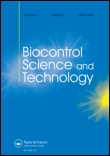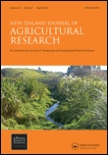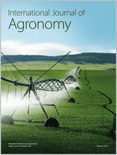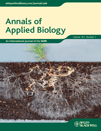
NEMATOLOGY
Scope & Guideline
Exploring the Intricacies of Nematodes
Introduction
Aims and Scopes
- Taxonomy and Systematics:
A core area of focus involves the identification and classification of nematodes, including the description of new species and revisions of existing taxa. This work is crucial for understanding the biodiversity of nematodes and their evolutionary relationships. - Ecological Interactions and Roles:
Research on the ecological roles of nematodes in various environments, including their interactions with plants, soil health, and their roles as bioindicators of ecosystem health. - Plant-Parasitic Nematodes:
Significant emphasis is placed on the study of plant-parasitic nematodes, particularly their impact on crop production, management strategies, and resistance mechanisms in host plants. - Entomopathogenic Nematodes:
The journal covers research on entomopathogenic nematodes, which are used as biological control agents against insect pests, exploring their effectiveness, mechanisms of action, and applications in integrated pest management. - Molecular and Genetic Studies:
Molecular characterization and genetic studies of nematodes are increasingly featured, focusing on phylogenetics, population genetics, and the use of molecular tools for diagnostics and understanding nematode biology. - Biocontrol and Management Strategies:
Research on nematicides, biological control methods, and sustainable agricultural practices aimed at managing nematode populations and mitigating their impact on crops.
Trending and Emerging
- Molecular Diagnostics and Genomic Studies:
There is a significant increase in research utilizing molecular techniques for diagnostics and phylogenetic studies. This trend is driven by advancements in sequencing technologies and bioinformatics, enabling more precise identification and understanding of nematode diversity. - Integrated Pest Management and Sustainable Practices:
Research focused on integrated pest management strategies, including the use of biological control agents and sustainable agricultural practices, is gaining traction as the agricultural sector seeks to reduce chemical inputs and enhance ecosystem health. - Nematode Biocontrol Innovations:
Emerging studies on the development and application of biocontrol agents, particularly entomopathogenic nematodes, are becoming more prominent. This reflects a shift toward finding environmentally friendly pest management solutions. - Impact of Climate Change on Nematode Dynamics:
Research examining the effects of climate change on nematode populations, distribution, and interactions with hosts is increasingly important, addressing the need to understand how global changes affect agricultural systems. - Nematodes in Soil Health Assessment:
There is a growing focus on the role of nematodes as bioindicators of soil health, with studies exploring their community structure and function in relation to soil management practices and environmental changes.
Declining or Waning
- Traditional Chemical Control Methods:
The focus on conventional chemical nematicides has decreased as there is a growing preference for sustainable and environmentally friendly alternatives. This shift is influenced by increased awareness of environmental impacts and regulatory changes. - Generalized Host-Pathogen Interaction Studies:
While specific studies on plant-parasitic nematodes remain prevalent, broader studies on host-pathogen interactions without a strong focus on nematode specifics have become less common, suggesting a trend towards more targeted research. - Studies on Free-Living Nematodes:
Research on free-living nematodes, although still relevant, has seen reduced emphasis compared to plant-parasitic and entomopathogenic nematodes, possibly due to a greater focus on applied research with direct agricultural implications.
Similar Journals

Revista Brasileira de Ciencias Agrarias-Agraria
Advancing agricultural knowledge for a sustainable future.Revista Brasileira de Ciencias Agrarias-Agraria is an esteemed academic journal published by the Universidade Federal Rural de Pernambuco, dedicated to advancing the field of agricultural and biological sciences. With a focus on disseminating high-quality research, this journal plays a pivotal role in fostering knowledge exchange within the agricultural community, particularly in Brazil and beyond. As a Q3 ranked publication in the Agricultural and Biological Sciences category, Revista Brasileira de Ciencias Agrarias-Agraria contributes to the growing body of literature by featuring insightful articles from both emerging and established researchers in the field. The journal has been consistently published since 2011 and is committed to open access principles, ensuring that research findings are accessible to a wide audience. Researchers, professionals, and students will find this journal an invaluable resource for deepening their understanding of current trends and innovations in agriculture.

Revista de Agricultura Neotropical
Transforming Challenges into Opportunities in AgricultureRevista de Agricultura Neotropical, published by UNIV ESTADUAL MATO GROSSO SUL, serves as a pivotal platform for disseminating research in the fields of agronomy and crop science. Since its inception as an open-access journal in 2014, it has been dedicated to promoting innovative research and practical applications within the agricultural sector, specifically tailored to the challenges and dynamics of the tropical agriculture landscape in Brazil and beyond. Although currently positioned in the Q4 quartile of Scopus rankings, and with a modest agricultural science percentile, the journal actively encourages contributions that highlight sustainable agricultural practices, tropical crop management, and emerging technologies in farming. With its commitment to open access, the Revista de Agricultura Neotropical broadens the reach of critical knowledge, making it accessible to researchers, professionals, and students alike, thus fostering a collaborative environment for advancing agri-scientific initiatives.

Legume Research
Connecting Science and Sustainability through LegumesLegume Research, published by the AGRICULTURAL RESEARCH COMMUNICATION CENTRE in India, is an essential peer-reviewed journal focusing on advancements in the field of agronomy, crop science, soil science, and plant science. With an ISSN of 0250-5371 and operating since 2008, this journal caters to researchers, agricultural professionals, and students interested in the critical role of legumes in sustainable agriculture and food security. It ranks within the third quartile (Q3) in several prominent categories, reflecting its contribution to the agricultural and biological sciences community—ranking #279 in Agronomy and Crop Science, #113 in Soil Science, and #376 in Plant Science based on Scopus metrics. Although not open access, Legume Research remains a vital resource for those seeking to enhance their knowledge and contribute novel research findings in the ever-evolving discipline of legume cultivation and utilization. With a clear objective to disseminate impactful research, this journal significantly contributes to the global understanding of legumes' ecological, economic, and nutritional importance.

Scientific Papers-Series A-Agronomy
Exploring New Frontiers in Crop ManagementScientific Papers-Series A-Agronomy is a premier academic journal dedicated to the field of agronomy, published by the University of Agronomic Sciences and Veterinary Medicine Bucharest. With an emphasis on innovative research and practical applications, this journal serves as a vital platform for disseminating new findings in agricultural science, sustainable practices, and crop management strategies. Though the journal currently operates under traditional access options, it remains pivotal in supporting the academic community in Romania and beyond. The ISSN (2285-5785) and E-ISSN (2285-5807) ensure that the work published is easily accessible to researchers and practitioners alike, fostering the exchange of knowledge and advancements within the agricultural sector. By continually addressing contemporary issues in agronomy, Scientific Papers-Series A-Agronomy strives to promote sustainable agricultural practices and enhance food security, making it an essential resource for professionals, students, and researchers keen on advancing their understanding and expertise in this critical field.

Revista Caatinga
Empowering Research, Cultivating InnovationRevista Caatinga is a premier open-access journal published by Universidade Federal Rural do Semi-Árido (UFERSA), dedicated to the dissemination of significant research within the field of Agricultural and Biological Sciences. Since its inception in 2006, the journal has aimed to bridge the knowledge gap in various aspects of agricultural practices and biological phenomena, making vital contributions to the scientific community. With its publications indexed in Scopus and holding an impressive Q2 categorization in the competitive landscape of agricultural sciences, the journal ranks within the top half of its category (100/221), demonstrating a commitment to quality scholarship. The journal is based in Brazil and covers a wide array of topics relevant to both local and global agricultural challenges. By fostering open access, Revista Caatinga ensures that vital research is available to a broad audience, promoting knowledge sharing and collaboration among researchers, practitioners, and students around the world.

BIOCONTROL SCIENCE AND TECHNOLOGY
Innovating Biocontrol Strategies for a Sustainable FutureBIOCONTROL SCIENCE AND TECHNOLOGY is a premier, peer-reviewed journal published by Taylor & Francis Ltd that specializes in the dynamic fields of Agronomy and Insect Science. Established in 1991, this journal has garnered a reputation for disseminating high-quality, impactful research with an impressive 2023 Scopus rank of 53 out of 181 in Insect Science and 153 out of 406 in Agronomy, placing it in the Q2 category for both fields. With its ISSN 0958-3157 and E-ISSN 1360-0478, the journal serves as a vital resource for researchers, professionals, and students dedicated to advancing understanding and innovation in pest management and biocontrol strategies. Although not an open-access journal, it offers comprehensive insights that are crucial for professionals aiming to tackle agricultural challenges and enhance food security. The journal’s continuous coverage from 1991 to 2024 ensures that it remains at the forefront of significant advancements in biocontrol, making it an essential read for anyone interested in sustainable agricultural practices and integrated pest management.

NEW ZEALAND JOURNAL OF AGRICULTURAL RESEARCH
Advancing Agricultural Science for a Sustainable FutureNEW ZEALAND JOURNAL OF AGRICULTURAL RESEARCH is a prestigious, peer-reviewed journal published by Taylor & Francis Ltd that has been at the forefront of agricultural science since its inception in 1958. With a strong focus on the fields of Agronomy and Crop Science, Animal Science and Zoology, Plant Science, and Soil Science, this journal has established itself in the academic community, achieving a notable Q2 ranking in various agricultural categories as of 2023. The journal thrives on its commitment to disseminating cutting-edge research and innovative practices that address contemporary challenges in agriculture. Although it does not currently offer an open access option, its valuable contributions can be accessed through various academic platforms, ensuring that vital research reaches a wide audience of researchers, professionals, and students globally. The journal's continued relevance and authority are reflected in its strong Scopus rankings, further emphasizing its role as a critical journal within the agricultural sciences.

SPANISH JOURNAL OF AGRICULTURAL RESEARCH
Fostering Growth Through Open Access ResearchThe Spanish Journal of Agricultural Research (ISSN: 1695-971X, E-ISSN: 2171-9292), published by the prestigious Consejo Superior Investigaciones Cientificas (CSIC), serves as a vital resource for those engaged in the fields of agronomy and crop science. Established as an Open Access journal since 2003, it aims to foster the dissemination of innovative research and practical applications related to agricultural practices and sustainability. With its Q3 category in Agronomy and Crop Science and a Scopus ranking of #224 out of 406, the journal provides an accessible platform for scholars to share valuable findings that enhance agricultural productivity and environmental stewardship. Covering research from 2006 to 2024, this journal continues to be instrumental for researchers, professionals, and students eager to remain at the forefront of agricultural science advancements.

International Journal of Agronomy
Advancing Agricultural Innovation for a Sustainable FutureIntroducing the International Journal of Agronomy, an influential publication in the field of agricultural sciences, established by HINDAWI LTD. With an impact factor that reflects its relevance and quality, this journal has been an essential resource for researchers and professionals since its shift to Open Access in 2009, facilitating widespread dissemination of knowledge. Based in the United States, the journal has achieved notable recognition within the academic community, currently ranked in the Q2 quartile among Agronomy and Crop Science, with an impressive Scopus Rank of #139 out of 406 in its category, representing the top 65th percentile. Spanning from 2013 to 2024, it aims to advance the understanding and innovation in agronomy through its rigorous peer-reviewed research articles, reviews, and case studies. With a commitment to enhancing global agricultural practices and sustainability, the International Journal of Agronomy stands as a vital platform for sharing cutting-edge findings that ultimately contribute to the advancement of the agronomic sciences.

ANNALS OF APPLIED BIOLOGY
Pioneering sustainable agriculture through impactful studies.Annals of Applied Biology, published by Wiley, stands as a pivotal resource in the fields of Agronomy and Crop Science, boasting an impressive impact factor that reflects its significance and influence in the academic community. With a storied history dating back to 1914, this journal serves as a comprehensive platform for innovative research and applied studies in agricultural biology, specifically aimed at improving crop production and sustainable practices. Currently categorized in the Q1 quartile for Agronomy and Crop Science in 2023, it ranks an admirable 82 out of 406 in the Scopus database, placing it within the top 79th percentile of its category. Researchers, professionals, and students worldwide rely on the Annals of Applied Biology for cutting-edge insights and advancements in applied biological research, making it a vital component of the scientific discourse aimed at addressing pressing agricultural challenges. Please note that this journal does not offer open access options, thus ensuring a rigorous peer review process and the integrity of published work.